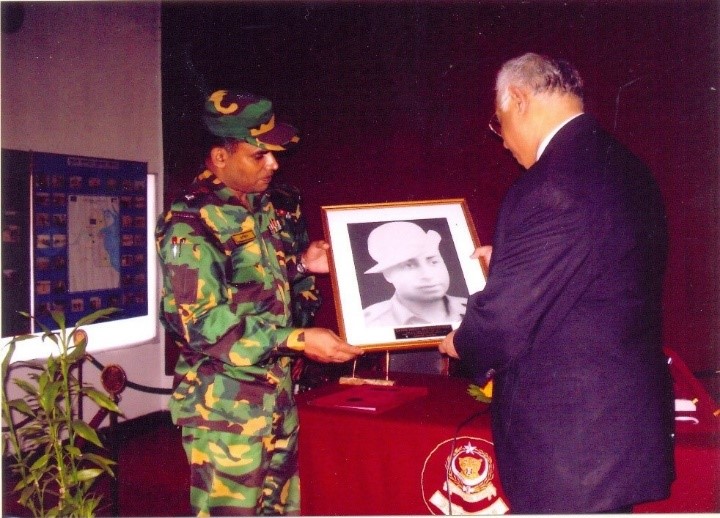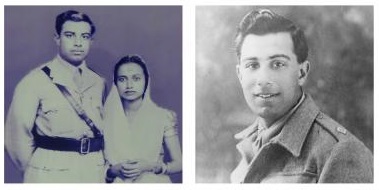Dear Readers,
A good man who was far ahead of his time, my father, Abdul Majeed Sehgal was certainly destined for far better things than what he apparently achieved during his lifetime. Since he died a contented person, he must have done better than we thought he did or perhaps his ambitions were limited, aspiring only that his children got sound upbringing and good education, providing both my sister and myself with a solid foundation for the future. What I admired him most for was that he never raised his voice in disciplining my (late) sister and me, the question of him ever raising his hands never probably crossed his mind. The greatest punishment for us was the quiet look of disappointment. Former Governor Balochistan Lt Gen (Retd) Sardar Farooq Khan Lodi and Capt (Retd) A A Jilani both served with him and confirmed this rather amazing attribute (in a soldier). He was a superb professional, his subordinates often spoke of him with awe. How much he was respected was apparent from the shock I received in 2008 in Dhaka, Bangladesh, on being presented his photograph from the CO 2 E Bengal signed by all officers, none of whom were born before 1971. While I was quite aware serving in 2 E Bengal how much respected he was, that they valued this Pakistani of Punjabi origin, was a real revelation. This Punjabi certainly remained a legend to Bengalis that survived the horrors of 1971.
My father very rarely spoke about himself, giving us only flashes of his schooling in Bombay, college in Sialkot and his short stint in a Medical College in Lahore before he joined the Army in 1942 shortly after his father’s death. He was born in Sialkot, the family tree indicates that he descended from Shaikh Yahya (urf Chaya), a Saint who embraced Islam about a 1000 years ago and whose tomb still exists near Jhelum. My grandfather Abdul Karim Sehgal had a construction company called “H Karim Brothers”. He joined his younger brother Abdullah who was Chief Engineer PWD in Bombay (now Mumbai) in the late 20s. While my granduncle designed the “Back Bay Reclamation Project”, H. Karim Brothers (in which my granduncle was a silent partner) constructed Mumbai’s famous Marine Drive. After my granduncle’s untimely death, my grandfather moved the family back to Sialkot, he owned most of a locality called Rangpura. My grandfather also died soon after in his early 40s and is buried in Rangpura.

The powers that be in GHQ Rawalpindi decided in 1949 in their infinite wisdom that my mother’s Bengali lineage was enough reason to post my father (then a Major and die hard 7/16 Punjabi, now 19 Punjab), kicking and screaming in protest, to lead a Company sized contingent from “Sat Sola” to raise 2nd Battalion The East Bengal Regiment (2EB), he went on to command the JUNIOR TIGERS in Comilla from early 1956 to 1958. Two of his adjutants Shafiullah, Ershad and another officer Zia ur Rahman, rose to Chief of Army Staff rank in the Bangladesh Army post 1971, Zia and Ershad went on to become Presidents. At least six others became major generals in Bangladesh. In Pakistan, Maj Gen (Retd) Nasrullah (his 2 IC in 2EB) and former Governor Balochistan Lt Gen (Retd) Sardar F S Lodi (who came to him in 2 EB as a subaltern) were present on May 22 on the “Dua” for my mother. Late Gen Iqbal Khan, Chairman Joint Chiefs of Staff Committee was attached as a Captain with 2EB for over six months time in 1957 with two companies of 2 FF and also functioned as his Adjutant during anti-smuggling “Operation Close Door” in then East Pakistan.
Courtesy of Gen Moeen, COAS Bangladesh Army, who was also commissioned in 2E Bengal in 1975, I was finally “allowed” to visit 2E Bengal on 04 Dec 2008, 37 years after 1971. Why I was not given this permission by my friends who have always been very kind to me, Gens H M Ershad and Zia ur Rahman, Lt. Gen ASM Nasim, Maj Gen Nurul Islam, Maj Gen Moin Chaudhry, etc. when they were in power, I only came to know on 04 Dec 2008 and that too by accident, but that is another story. Suffice to say that for me this visit was a very emotional one and I am eternally grateful to Moeen for it. I took my daughter Nefer along, she was born 2 years after her grandfather died. To see a photograph of her grandfather signed by the present CO 2E Bengal and all Officers being presented to me will remain a cherished moment for her.

I never discovered the ASALONG PAPERS (documents about full-fledged nearly six weeks long Brigade sized battle (one EPR Battalion, since called ASALONG MOUZA BATTALION, with 6FF in close support) with the Indians in 1962, this was considered an outright Pakistani victory because it evicted the Indians across the Feni River) till my mother died. This was the biggest operations conducted since Dir and Kalat (1958) till Rann of Kutch (1965), in very tough, forested and mountainous terrain (Director General EPR was Brig Mohammad Ahmed, MC, formerly CO 1 E Bengal and author of the book “MY CHIEF”. His son, Col (Retd) Salman Ahmed, joined 32nd PMA Long Course in May 1963, and was also commissioned into 1 E Bengal in September 1965). Now my father had two counts of rabid jealousy ranged against him with respect to a brilliant career, he was married to a Bengali and was a successful combat officer, a rarity in 1962. He was being considered for accelerated promotion when he had his first heart attack. He never once complained about this ending his professional career.
My father would take us to all the museums and archaeological sites and to all the sight seeing places in Pakistan, both East and West. When we got our first car in 1958 (an AustinA7), we were all over the place, even visiting Karachi by road from Pindi. We were never home on weekends. He took great pains with our historical and geographical knowledge. In retrospect I regret I have not spent the same quality time with my children. An educated, enlightened person, he would keep us sanitized from the rather feudal views of my mother which did not believe in any education except basic arithmetic with which to add up rentals and agricultural produce. As a last resort he sent both of us off to Boarding Schools. While he was in the Army and then after retirement serving as “Employee Relations Advisor” with a multi-national, he would invariably follow his own liberal thinking. It was only after his complete retirement (in 1971) that he succumbed somewhat to the rather narrow feudal philosophy of my mother, mainly for the sake of domestic peace. He was very farsighted, before he died he signed away all his rights to the family properties in Sialkot to his brother and sisters, this was to cut me loose from being dragged through an endless legal brawl in the courts. He had an absolute faith that I would do well in life and would tell me so. When he was dying he told me never ever to become partner again with a particular Saeed Abdul Malik son of late Lt Gen Akhtar Hussain Malik I had been looking after for many years, “he hates you and is jealous of you”, he said, “he is only waiting for me to die and then he will try and wriggle his way back into your graces. Never have anything to do with him”. Of course I didn’t listen to him and of course I suffered, and suffered badly.

My father had his first heart attack in 1964, by 1983 he had developed an enlarged heart, dying surely but certainly over a period of three and half months, in fact exactly 100 days from the date of the last attack on May 3, 1983. During this period he kept us in good cheer, smiling at us on coming out of cardiac arrest twice. When I mentioned that he did not seem to feel fear or at least he did not show it, he said, “Why? Everyone has to die one day. I have had a good life and I know you will look after your mother. I owe nothing to anyone, my only regret is that your younger sister died before me!” A very contented person, my father died peacefully in his own bed at home at 03:00 am on Aug 13, 1983 in Karachi. He was less than a month past his 62nd birthday, but he died as he wished, on his own bed and not owing anything to anyone. My mother survived him by eighteen years later on May 19, 2001 and is buried beside him in Abdullah Shah Ghazi Mazar in Clifton, Karachi.
My father doted on my son Zarrar, showering all his love on him during the last years of his life. In many ways Zarrar has inherited his brilliance and perhaps more so because of his doubly “mixed” blood. Wherever my father is, he must be proud beyond measure of Zarrar and his children.
“The opinions/views expressed in Defence Journal are entirely those of the writers and cannot be construed to reflect the official views of Defence Journal”.




